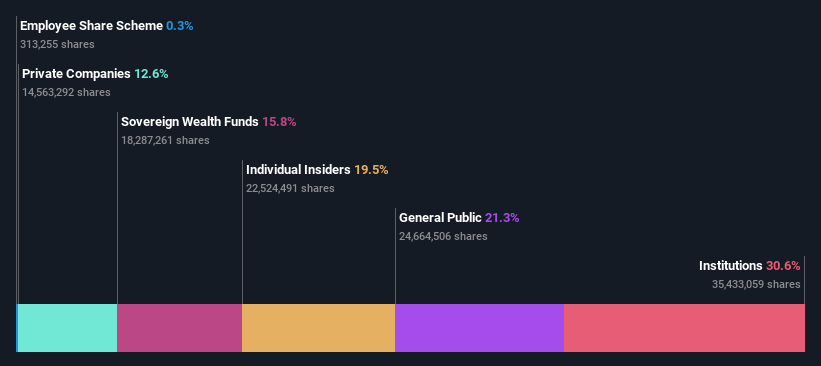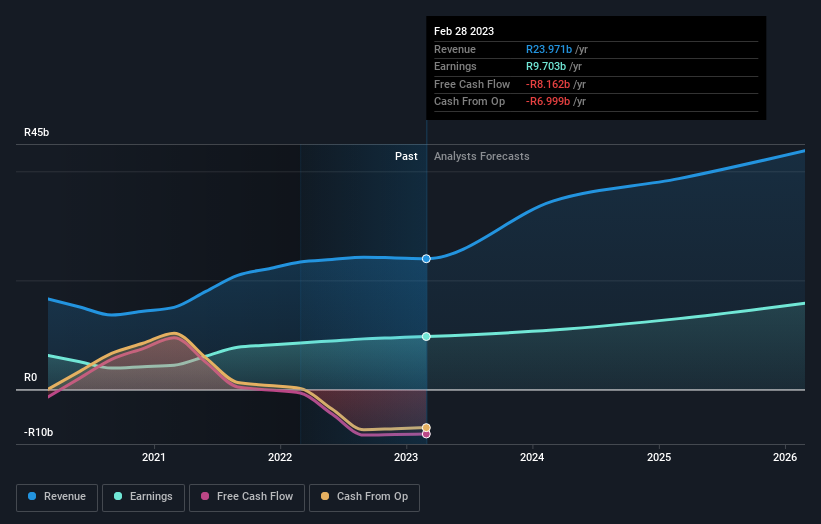Recent uptick might appease Capitec Bank Holdings Limited (JSE:CPI) institutional owners after losing 26% over the past year
Key Insights
Significantly high institutional ownership implies Capitec Bank Holdings' stock price is sensitive to their trading actions
51% of the business is held by the top 6 shareholders
A look at the shareholders of Capitec Bank Holdings Limited (JSE:CPI) can tell us which group is most powerful. We can see that institutions own the lion's share in the company with 31% ownership. In other words, the group stands to gain the most (or lose the most) from their investment into the company.
Institutional investors would appreciate the 5.6% increase in share prices last week, given their one-year returns have been disappointing at 26%.
Let's take a closer look to see what the different types of shareholders can tell us about Capitec Bank Holdings.
See our latest analysis for Capitec Bank Holdings
What Does The Institutional Ownership Tell Us About Capitec Bank Holdings?
Institutional investors commonly compare their own returns to the returns of a commonly followed index. So they generally do consider buying larger companies that are included in the relevant benchmark index.
Capitec Bank Holdings already has institutions on the share registry. Indeed, they own a respectable stake in the company. This implies the analysts working for those institutions have looked at the stock and they like it. But just like anyone else, they could be wrong. It is not uncommon to see a big share price drop if two large institutional investors try to sell out of a stock at the same time. So it is worth checking the past earnings trajectory of Capitec Bank Holdings, (below). Of course, keep in mind that there are other factors to consider, too.
Capitec Bank Holdings is not owned by hedge funds. Looking at our data, we can see that the largest shareholder is Public Investment Corporation Limited with 16% of shares outstanding. Michiel du Pre le Roux is the second largest shareholder owning 11% of common stock, and Lebashe Investment Group Proprietary Limited holds about 7.3% of the company stock. Additionally, the company's CEO Gerhardus Fourie directly holds 0.9% of the total shares outstanding.
We also observed that the top 6 shareholders account for more than half of the share register, with a few smaller shareholders to balance the interests of the larger ones to a certain extent.
Researching institutional ownership is a good way to gauge and filter a stock's expected performance. The same can be achieved by studying analyst sentiments. Quite a few analysts cover the stock, so you could look into forecast growth quite easily.
Insider Ownership Of Capitec Bank Holdings
The definition of an insider can differ slightly between different countries, but members of the board of directors always count. Company management run the business, but the CEO will answer to the board, even if he or she is a member of it.
Most consider insider ownership a positive because it can indicate the board is well aligned with other shareholders. However, on some occasions too much power is concentrated within this group.
Our information suggests that insiders maintain a significant holding in Capitec Bank Holdings Limited. It has a market capitalization of just R177b, and insiders have R35b worth of shares in their own names. That's quite significant. Most would be pleased to see the board is investing alongside them. You may wish to access this free chart showing recent trading by insiders.
General Public Ownership
With a 21% ownership, the general public, mostly comprising of individual investors, have some degree of sway over Capitec Bank Holdings. This size of ownership, while considerable, may not be enough to change company policy if the decision is not in sync with other large shareholders.
Private Company Ownership
Our data indicates that Private Companies hold 13%, of the company's shares. It's hard to draw any conclusions from this fact alone, so its worth looking into who owns those private companies. Sometimes insiders or other related parties have an interest in shares in a public company through a separate private company.
Next Steps:
I find it very interesting to look at who exactly owns a company. But to truly gain insight, we need to consider other information, too. Consider for instance, the ever-present spectre of investment risk. We've identified 1 warning sign with Capitec Bank Holdings , and understanding them should be part of your investment process.
If you are like me, you may want to think about whether this company will grow or shrink. Luckily, you can check this free report showing analyst forecasts for its future.
NB: Figures in this article are calculated using data from the last twelve months, which refer to the 12-month period ending on the last date of the month the financial statement is dated. This may not be consistent with full year annual report figures.
Have feedback on this article? Concerned about the content? Get in touch with us directly. Alternatively, email editorial-team (at) simplywallst.com.
This article by Simply Wall St is general in nature. We provide commentary based on historical data and analyst forecasts only using an unbiased methodology and our articles are not intended to be financial advice. It does not constitute a recommendation to buy or sell any stock, and does not take account of your objectives, or your financial situation. We aim to bring you long-term focused analysis driven by fundamental data. Note that our analysis may not factor in the latest price-sensitive company announcements or qualitative material. Simply Wall St has no position in any stocks mentioned.
Join A Paid User Research Session
You’ll receive a US$30 Amazon Gift card for 1 hour of your time while helping us build better investing tools for the individual investors like yourself. Sign up here

 Yahoo Finance
Yahoo Finance 

